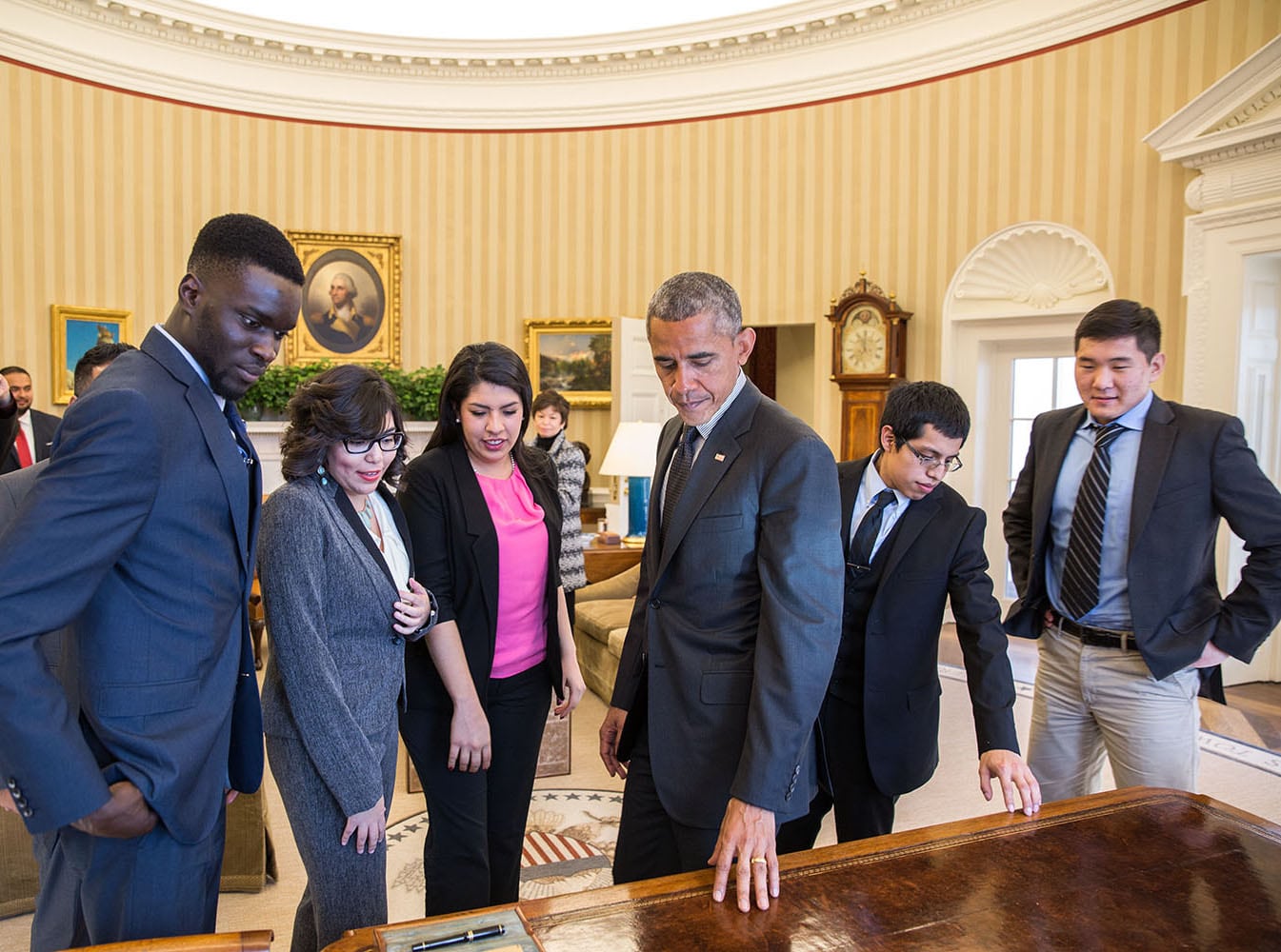An upcoming judicial decision in Texas may leave the fate of DACA with the Supreme Court.
DACA, or Deferred Action for Childhood Arrivals, is the Obama-era program providing a pathway to citizenship for immigrant students in the U.S. known as ‘dreamers’. But the program is facing a number of legal challenges and if the high court ultimately takes up the case, it appears unlikely that DACA will survive judicial scrutiny in the right-leaning court.
In early August, District Judge Andrew Hanen heard arguments in a lawsuit brought by 10 states, including Texas, claiming that DACA is unconstitutional. Experts believe that Hanen, a George W. Bush appointee, is likely to decide in Texas’s favor.
However, earlier this month, Washington, DC District Judge John Bates upheld a previous order in April [April 24, 2018 Decision] holding that DACA had to be reinstated because the Trump Administration failed to adequately justify its termination of the program. [August 3, 2018 Opinion]. If Judge Hanen were to decide that DACA is unconstitutional, this would increase the probability of a circuit split.
Currently, appeals are also pending in the Second, Fourth, and Ninth Circuits. The only circuit court expected to issue a ruling soon is the Ninth Circuit.

A circuit split is created when two or more federal appeals courts decide the same legal issue differently. A split can be resolved by Congress passing new legislation or a Supreme Court decision deciding the contested legal issue. When circuit courts are in conflict over a legal question, the Supreme Court is more likely to hear a case to ensure uniformity in federal law.
“For DACA recipients around the country, it’s a time of real uncertainty” said Megan Mack, an associate director at Ayuda, a non-profit organization that provides legal and social services for low-income immigrants and their families. “They don’t know what to expect.” Mack, an Obama appointee in the Department of Homeland Security, helped organize legal clinics to advise those affected when the Trump Administration announced its intention to terminate DACA last Fall.
“We’re getting a lot of inquiries from people, either DACA clients, their relatives, and also community members who know, work with, or interact with people that have DACA,” Mack told Lima Charlie News.
Although the Trump Administration has attempted to end the program, eligible immigrants can still apply for DACA. Ayuda advises DACA recipients to apply for renewal up to one year in advance.
But if a circuit split does occur, and the case is heard in the Supreme Court, this likely means trouble for the ‘dreamers’. The Court recently upheld President Trump’s travel ban, and Trump nominated DC Circuit Judge Brett Kavanaugh, a reliable conservative, to fill the vacancy left by Justice Kennedy’s retirement.
DACA is dead because the Democrats didn’t care or act, and now everyone wants to get onto the DACA bandwagon… No longer works. Must build Wall and secure our borders with proper Border legislation. Democrats want No Borders, hence drugs and crime!
— Donald J. Trump (@realDonaldTrump) April 2, 2018
Judge Bates gave the Trump Administration 20 days to appeal his decision reinstating DACA, but if Judge Hanen decides that the program is unconstitutional then the case will likely end up at the Supreme Court. If this occurs, there is a real possibility that the Court will decide in Trump’s favor, terminating the program and leaving the ‘dreamers’ in limbo.
“This is upward to 700,000 people who are able to work lawfully in the United States,” Mack said. “In the State of Virginia, you have a lot of DACA recipients who are no longer eligible for in-state tuition to go to college or who will be ineligible to work. They would have to go underground.”
In Virginia, DACA recipients and people with temporary protected status are entitled to in-state tuition at colleges. “I think it would lead to a lot of tragedy, and for a lot of communities. I think it would be an economic disadvantage for the United States to go down that road,” Mack added.
Hans von Spakovsky, a Senior Legal Fellow at the Heritage Foundation, sees advantages for the U.S. if DACA is overturned. Spakovsky previously served as a counsel to the Assistant Attorney General for Civil Rights in the U.S. Justice Department. “Providing work permits to illegal aliens takes jobs away from American citizens and providing them with access to public benefits hurts taxpayers and increases public debt.”
Regarding the constitutionality of DACA, Spakovsky wrote in an email that the Obama Administration exceeded its constitutional authority by establishing a general, administrative amnesty program providing illegal aliens with lawful status. “Congress can do that, but not the president. The Constitution gives full authority to Congress to determine the rules of naturalization and immigration…. Congress has never delegated him this authority.”
Conversely, Mack believes that the Obama Administration acted within its constitutional authority.
“An administration is able to make case by case discretionary decisions about individual status,” Mack said, adding that Immigration and Customs Enforcement makes “discretionary decisions about who they’re going to arrest, and in the same way, the president can make discretionary decisions about whom not to deport.”
President Obama created the DACA program in 2012 after Congress failed to pass the DREAM Act. This legislation was meant to address the increasing number of illegal immigrant students, known as dreamers, by providing them with a pathway to citizenship. Republicans immediately denounced the program as an abuse of executive power. After the Trump Administration announced its intention to end DACA in 2017, Senator Rand Paul voiced support for Trump’s decision, arguing that DACA was unconstitutional because Obama “created law” by implementing the policy. While he was sympathetic to the plight of Dreamers, he stated that “you can’t have open borders and a welfare state…. We’ve got to have some rules” regarding immigration.”
Democrats were highly critical of the Trump Administration’s decision to end DACA.
Senator Tim Kaine, a strong supporter of DACA, stated that Trump was “heartless” for ending a program that protected “hundreds of thousands of young people who were brought to the United States through no fault of their own” and that Trump’s decision to end DACA “will force DACA recipients back into the shadows and put them in danger of being deported from the only home they’ve ever known.”
For now, the question of the constitutionality of DACA remains unanswered. It appears likely that it will ultimately fall to the Supreme Court to decide the fate of America’s dreamers.
UPDATE [Sept. 2., 2018]
In a decision that surprised many in the legal establishment, on August 31, 2018, Judge Hanen denied Texas’s request for a preliminary injunction. For the moment, this means DACA remains in place and conflicting legal judgements were avoided. However, in his decision, Hanen noted that he believes DACA is unconstitutional and that the plaintiffs are likely to succeed in their argument. Texas can still appeal Judge Bates’s decision to the Fifth Circuit Court of Appeals, so although DACA survived this day in court, the future of program remains uncertain.
Alex Kish, Lima Charlie News
Alex Kish is a U.S. Marine veteran and a law student at George Washington University. He enlisted as an MP, and deployed to the American Embassy in Sana’a, Yemen as a security augment in 2013. Currently, Alex is a volunteer at Veterans Education Success, an organization that advocates for veterans rights in higher education.
Lima Charlie provides global news, featuring insight & analysis by military veterans and service members Worldwide.
For up-to-date news, please follow us on twitter at @LimaCharlieNews
In case you missed it:

![Image DACA Dreamers face uncertainty amid potential conflicting federal courts [Lima Charlie News][Photo: Mark Wilson]](https://limacharlienews.com/wp-content/uploads/2018/08/DACA-Dreamers-face-uncertainty-amid-potential-conflicting-federal-courts-1.jpg)



![Image Ambitions Never Laid to Rest - An Open Society vs. The Terrorist [Lima Charlie News] (Image: Patrick Hertzog)](https://limacharlienews.com/wp-content/uploads/2018/12/Screen-Shot-2018-12-28-at-2.37.54-PM-480x384.png)
![Image International students face narrowing opportunities to remain in the US after graduation [Lima Charlie News]](https://limacharlienews.com/wp-content/uploads/2018/08/International-students-face-narrowing-opportunities-to-remain-in-the-US-after-graduation-480x384.png)
![Image Venezuela's refugees add pressure to Colombia's presidential race [Lima Charlie News]](https://limacharlienews.com/wp-content/uploads/2018/03/Venezuelas-refugees-add-pressure-to-Colombias-presidential-race-480x384.png)



![Image Memorial Day may soon be a remembrance of democracy and those who had the courage to defend it [Lima Charlie News]](https://limacharlienews.com/wp-content/uploads/2018/05/Memorial-Day-may-soon-be-a-remembrance-of-democracy-and-those-who-had-the-courage-to-defend-it-Lima-Charlie-News-480x384.png)
![The Mind of Bolton - AUMF and the New Iran War [Lima Charlie News]](https://limacharlienews.com/wp-content/uploads/2019/05/Inside-the-mind-of-Bolton-Lima-Charlie-News-main-01-480x384.png)
![Image Ambitions Never Laid to Rest - An Open Society vs. The Terrorist [Lima Charlie News] (Image: Patrick Hertzog)](https://limacharlienews.com/wp-content/uploads/2018/12/Screen-Shot-2018-12-28-at-2.37.54-PM-150x100.png)
![Image International students face narrowing opportunities to remain in the US after graduation [Lima Charlie News]](https://limacharlienews.com/wp-content/uploads/2018/08/International-students-face-narrowing-opportunities-to-remain-in-the-US-after-graduation-150x100.png)